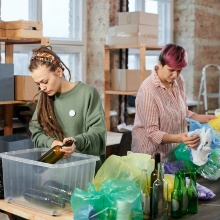In Germany, the protection of the environment is taken very seriously. Recycling and waste separation are two important aspects of this commitment. It is estimated that about 63 percent (According to the German Federal Environment Agency, 2019) of all waste in Germany is recycled, making it one of the leading countries in Europe when it comes to environmental conservation. The German government has implemented a nationwide waste separation system to help ensure that as much waste as possible is recycled. In Germany, household waste is typically divided into five categories: paper and cardboard, glass, metal and plastic, organic matter, and residual waste.
Organic waste is then composted, paper is recycled, and residual waste is sent to an incinerator. The waste separation system is mandatory, meaning that households are fined if they do not comply. This has led to an increase in recycling rates in Germany, which is now among the highest in Europe. Separating the garbage can be tricky in different ways and it is recommended to have a look at one of the waste separation guide lines from time to time. For example, pizza boxes will go to the paper and cardboard recycling bin but if they are oily or if not clean enough, they cannot be recycled and it should go to the residual waste.
Another example is regular light bulbs which you can dispose it to the residual waste but energy-saving lamps in the form of tubular and non-tubular fluorescent lamps as well as compact fluorescent lamps do not belong in the household waste under any circumstances. These kinds of lamps contain toxic mercury and fluorescent powder. In contrast to the disposal of light bulbs, they must therefore be handed in at municipal collection points or in collection boxes at specialist retailers or supermarkets. LED lamps also do not belong in the household waste.
For the wide range of glass bottles, plastic bottles and cans, you pay some deposits when you buy from the supermarkets and you will get it back if you return them to the supermarkets using the designated machines. For the rest of the glasses, based on their colors, there are glass collecting containers in collection points in the neighborhood. You should be careful for the time of the allowed disposal of the glasses as well. It is usually written on the containers.
Based on waste separation rules and guidelines, anyone who illegally disposes waste without proper separation must expect fines, some of which can be severe. Penalties vary by state and amount of illegally discarded waste (for example lamps) can be as much as a thousand euros.
As an international student in Germany, you can do your part to help protect the environment. Start by getting familiar with the waste separation system and always ensure that your waste is properly separated. I know this all sounds a bit complicated. Don't worry. Usually you can find detailed information about waste separation on the website of the city where you live. And maybe you can just ask your neighbors.
Masoud
Comment on this article
Your email address will not be published.




